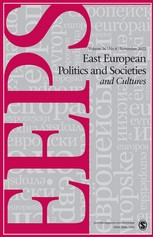Monitoring Democracy in the Eastern Neighbourhood: When Are the EU’s Assessments Lenient and Why?
Monitoring Democracy in the Eastern Neighbourhood: When Are the EU’s Assessments Lenient and Why?
Author(s): Lusine BadalyanSubject(s): Environmental and Energy policy, Government/Political systems, International relations/trade, Political behavior, Comparative politics, EU-Approach / EU-Accession / EU-Development
Published by: SAGE Publications Ltd
Keywords: European Union; democracy promotion; European Neighbourhood Policy; democracy measurements; leniency;
Summary/Abstract: How reliable are the EU’s reports when assessing its Eastern neighbouring countries’ progress towards democracy? To explore this question, I first developed an original scale that enables us to identify the variation in the quality of the EU’s assessment reports across the partner countries and over time. Subsequently, by employing both quantitative and qualitative research techniques, I carried out a systematic analysis of the key structural factors that tend to influence and compromise the quality of the EU’s assessments. The main results of the study suggest that the more dependent partner countries are on the EU as a source of development aid and export market, the less lenient the EU’s institutions appear in their assessment reports. Furthermore, the findings of the study show that somewhat counter-intuitively, the more authoritarian the regime in question is, the less willing the EU appears in criticizing the country’s poor democratic performance. However, when a certain level of political liberalization is underway, the EU institutions become rather critical in their assessment reports by explicitly and openly denouncing the country’s poor democratic performance.
Journal: East European Politics and Societies
- Issue Year: 36/2022
- Issue No: 04
- Page Range: 1263-1291
- Page Count: 29
- Language: English
- Content File-PDF

